Skills Labs
Our four skills labs provide a dynamic learning environment with advanced technology and simulation equipment to facilitate comprehensive training for healthcare professionals. Each lab is equipped with compressed air outlets for simulating oxygen administration and suctioning procedures, display monitors for showcasing instructional videos and educational content, and medication administration carts stocked with supplies for practicing safe medication management. One lab features ceiling lifts for simulating patient transfer scenarios, while vital sign monitors at each bedside allow learners to practice evaluating and responding to changes in patient status. The labs also have video recording capabilities for reviewing and debriefing simulation sessions, promoting active learning and facilitating constructive feedback. Overall, our commitment is to provide high-quality training experiences that empower healthcare professionals and improve patient outcomes.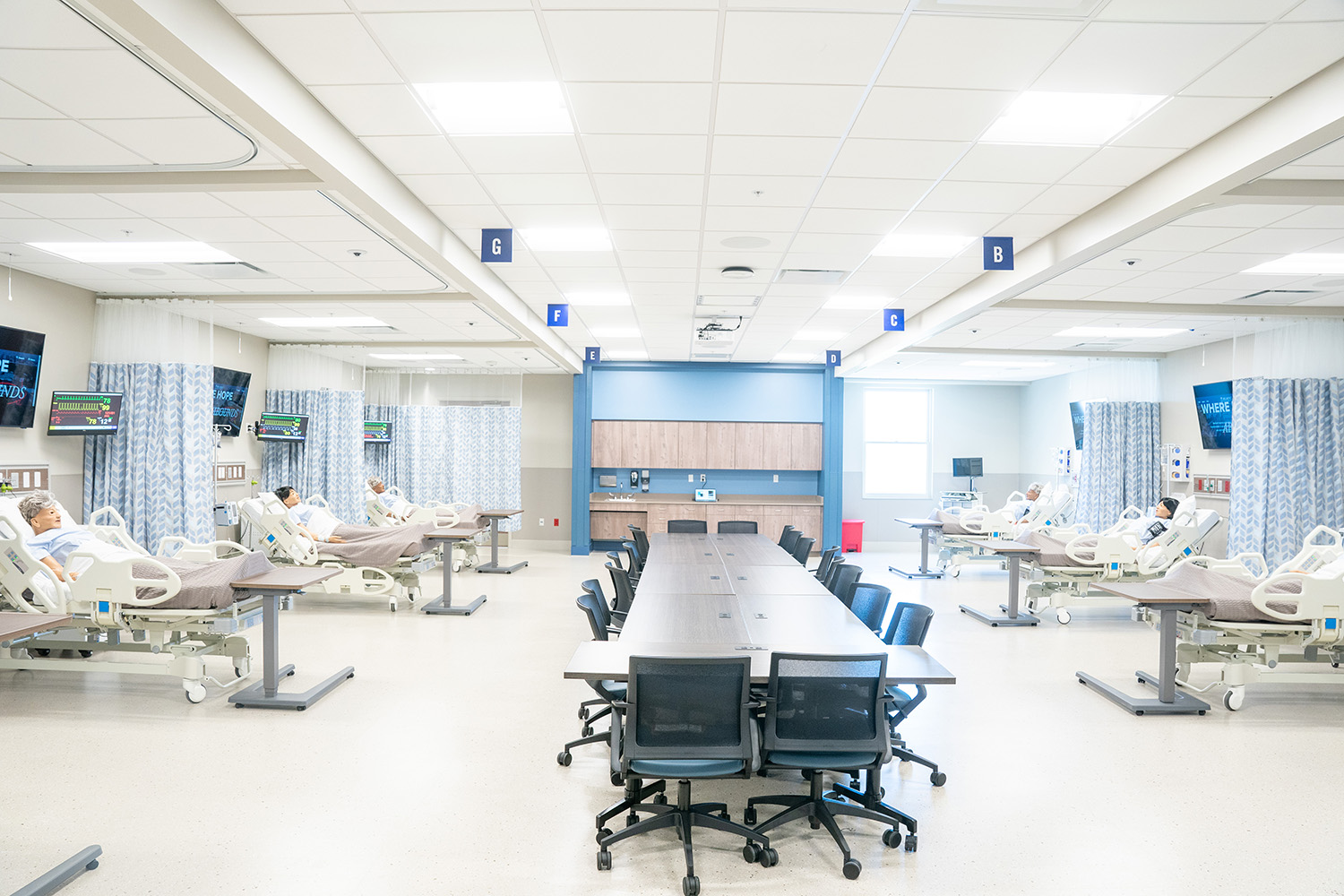
Assessment Lab
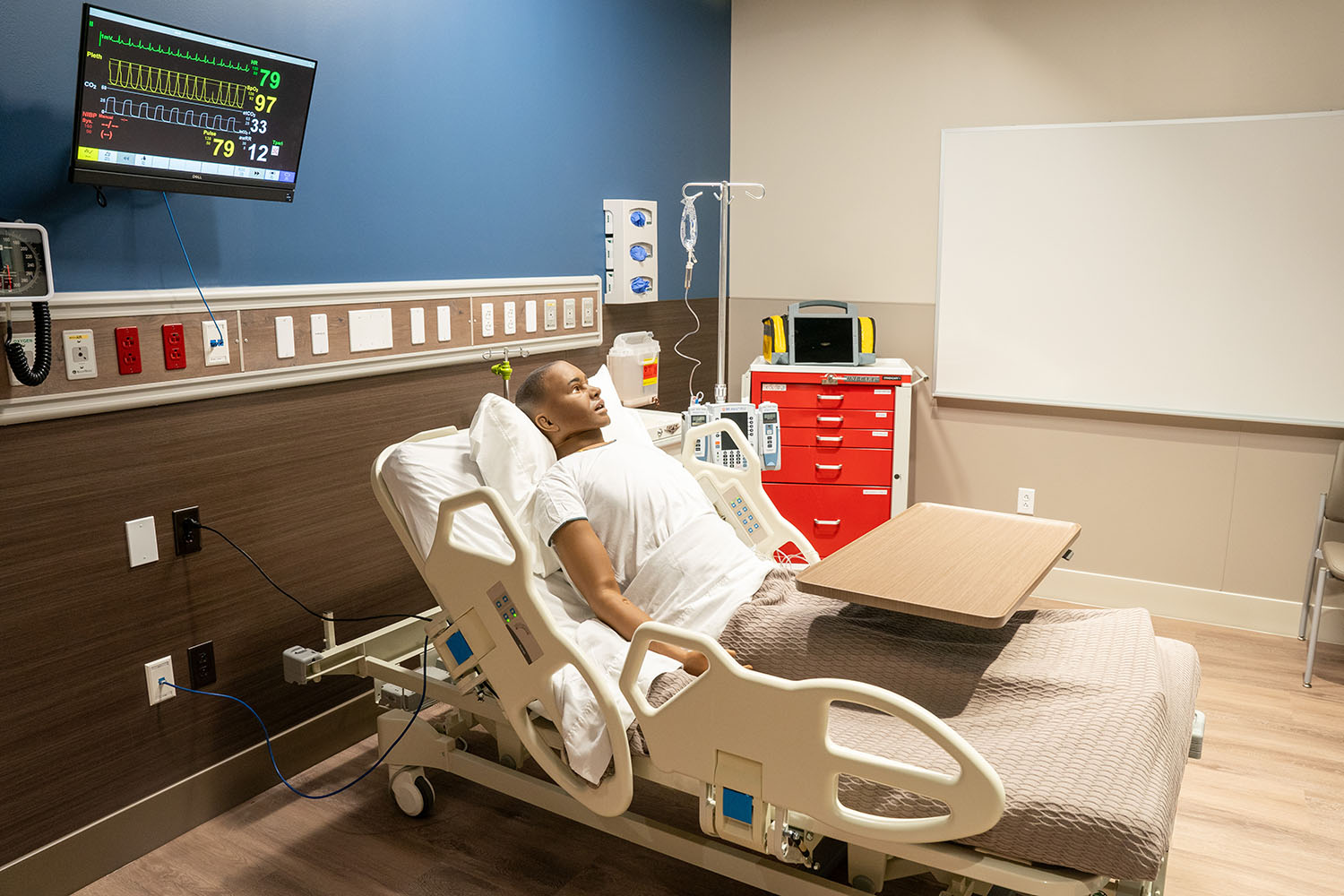
The 12-bed assessment lab is designed to provide comprehensive training experiences for healthcare professionals. Each bed is equipped with essential furnishings, including adjustable bedside tables, chairs, and privacy curtains, to simulate real patient care environments. Surrounding the assessment lab are strategically placed monitors that display educational content related to physical assessment techniques, diagnostic procedures, and clinical guidelines. These multimedia resources provide additional guidance and context for learners, enhancing their understanding of theoretical concepts and practical skills. Whether being used for reviewing anatomy diagrams or demonstrating examination maneuvers, the monitors support interactive learning experiences in the lab. The assessment lab is equipped with video capture technology to record simulation sessions for debriefing and reflection purposes.
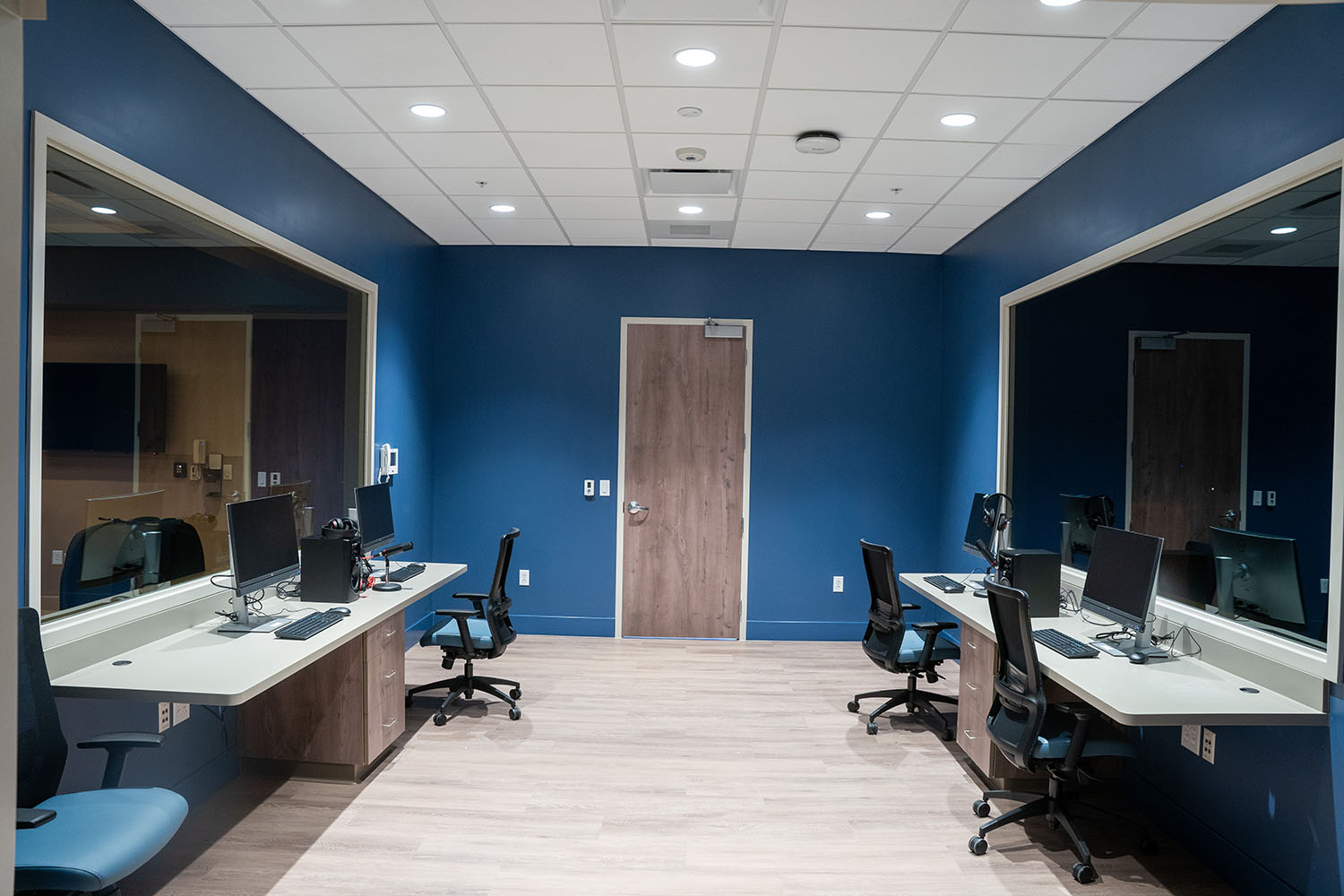
Simulation Rooms
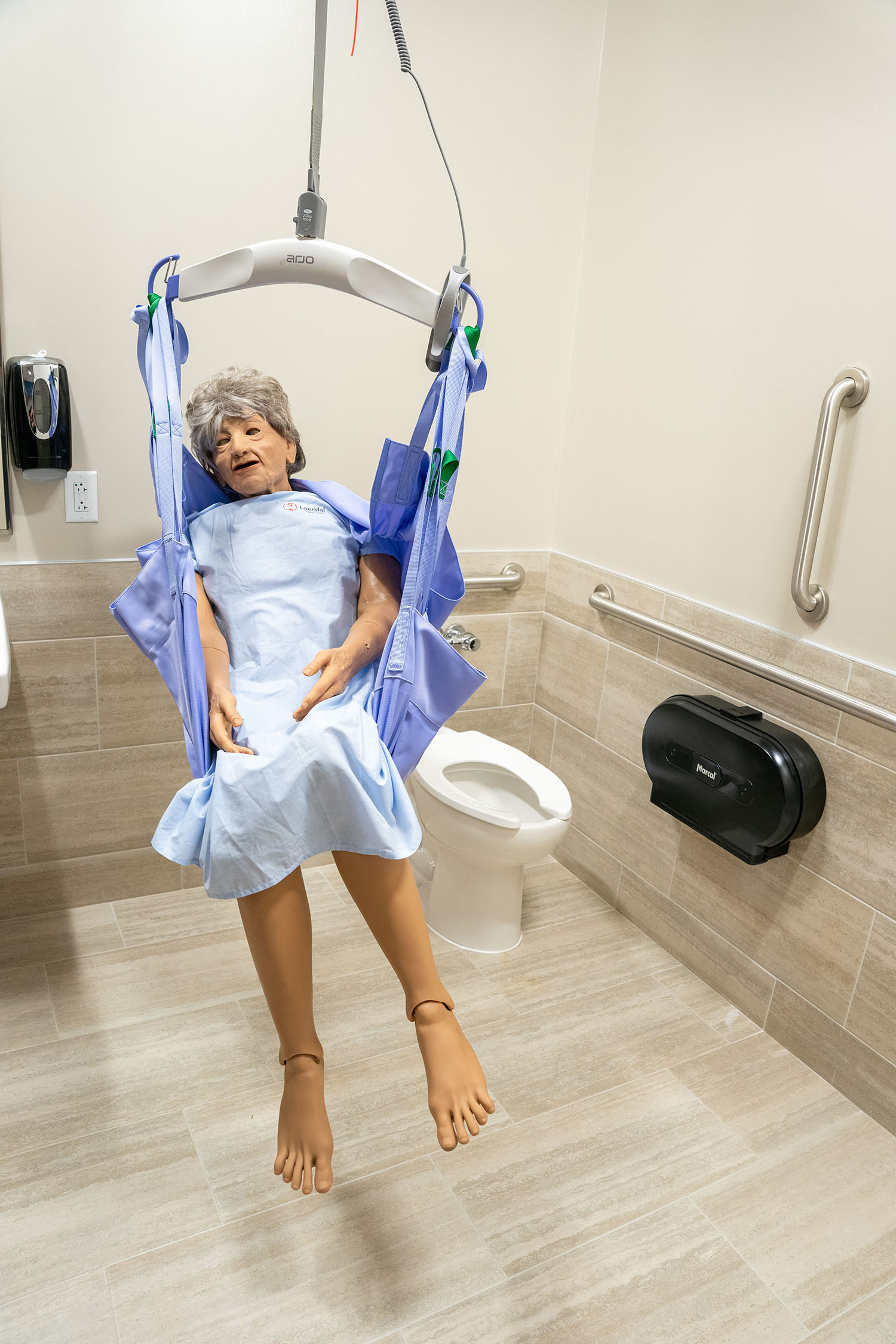
In our facility, there are eight simulation rooms designed to replicate traditional inpatient environments, with five single-bed rooms and three multi-patient rooms. Each room is equipped with video recording capability for reviewing and debriefing sessions, enabling faculty to provide constructive feedback and learners to engage in self-reflection. Compressed air outlets connected to oxygen and suction devices allow for practicing airway management techniques. Additionally, one room is equipped with a shower, toilet, sink, and patient lift for safe patient handling practice. Display monitors within the rooms showcase instructional videos and educational content to reinforce theoretical knowledge and practical skills. Adjacent to manikins, medication administration carts are stocked with a variety of medications to develop competency in medication management. This comprehensive setup promotes active learning, facilitates debriefing discussions, and enhances the overall educational experience.
Immersive Technology Room
Our cutting-edge immersive technology room is where the boundaries of traditional training methods are transcended through the use of Virtual Reality (VR) simulations. Equipped with MetaQuest goggles, this space offers an unparalleled learning experience for a wide range of applications, including healthcare training and beyond. Within the immersive technology room, users can engage with interactive training modules tailored to their specific learning objectives. Whether being used for practicing surgical procedures, conducting emergency response simulations, or honing communication skills in a team-based environment, our VR training modules offer hands-on learning experiences that are both engaging and educational. As users interact with the virtual environment, our VR simulation platform provides real-time feedback and assessment, allowing learners to track their progress and performance. From evaluating clinical skills to assessing decision-making abilities, our VR simulations offer valuable insights into individual strengths and areas for improvement. The immersive technology room supports collaborative learning experiences, allowing multiple users to interact and engage with the virtual environment simultaneously.
One unique product within the immersive technology room is the TolTech Sectra Anatomy Table. A simple tactile interface allows the learners to use intuitive hand gestures, multiple touch points, and easy-to-share tools so groups of up to 10 people can learn anatomy and explore clinical cases as a team. The visualization table provides an ideal environment for quickly integrating real clinical cases into problem-based learning scenarios. In addition, using the MetaQuest Glasses enables learners to quickly comprehend complex structural relationships and explore the human body in a highly interactive and intuitive way.
Exam Rooms & Standardized Patient Area
Our simulation suite includes dedicated spaces for training standardized patients. Standardized Patients/Participants (SPs) are trained actors portraying specific medical conditions or scenarios, and provide learners with realistic interactions and opportunities to practice clinical communication, history-taking, and physical examination skills in a controlled environment.
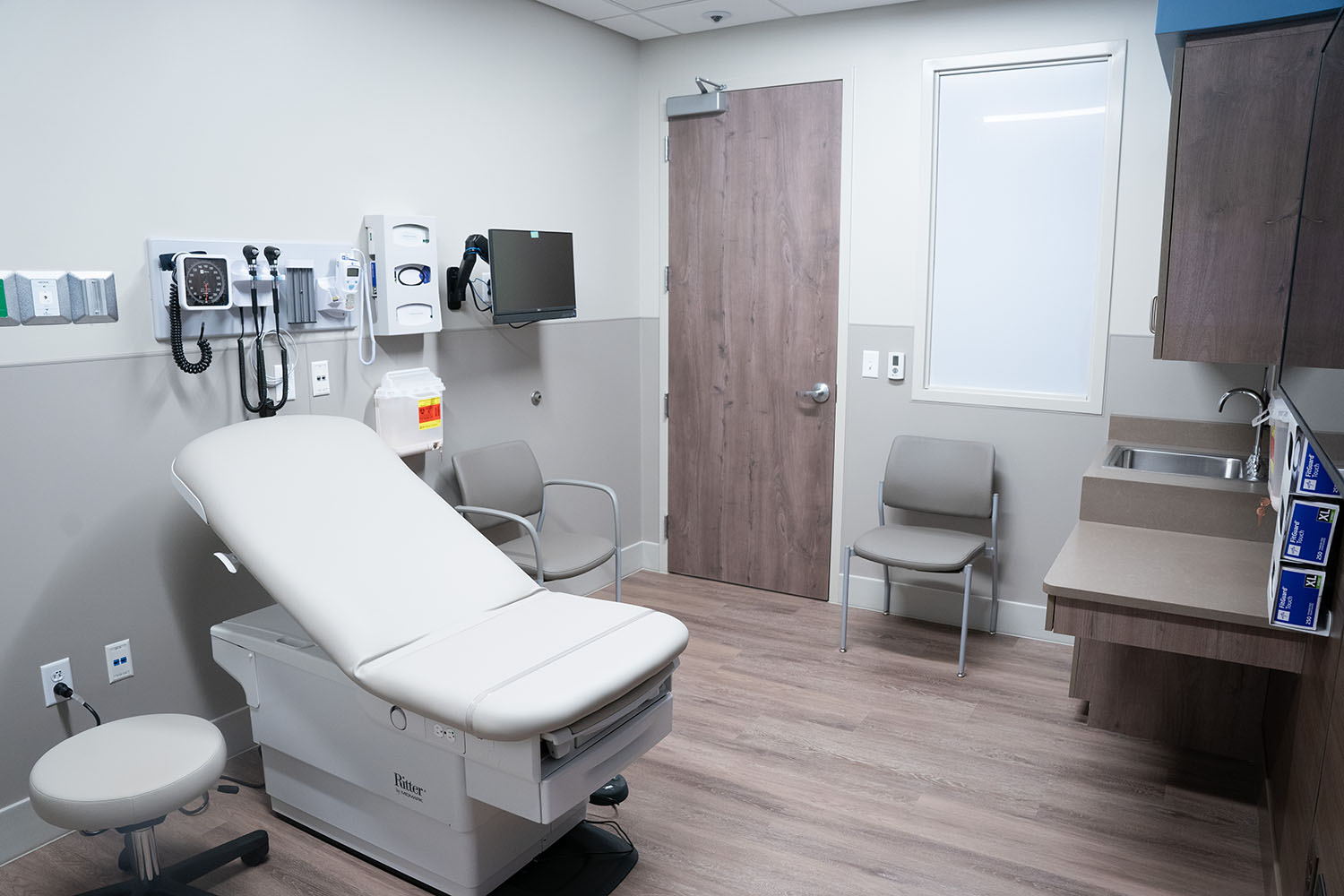
There are 24 exam rooms specifically designed for training health profession students. These rooms are equipped with exam tables, diagnostic sets, and medical equipment commonly found in clinical practice settings. Learners can practice conducting physical examinations, performing diagnostic tests, and developing treatment plans under the guidance of instructors or simulation facilitators. Each of the rooms is equipped with video capture technology to record simulation sessions for review and analysis. Cameras strategically placed within each training area capture the interactions between learners, standardized patients, and instructors from multiple angles. Video recordings allow faculty members to assess learner performance, provide feedback, and facilitate debriefing discussions to enhance learning outcomes.
Apartment Lab
The apartment lab is a simulated home environment, a versatile training space designed to prepare healthcare professionals for providing care in residential settings. This apartment replicates a typical home environment, complete with a living space, kitchen, bedroom, bathroom, and closet. The living space serves as a central area for various activities and interactions. Furnished with comfortable seating, a coffee table, and decor resembling a typical living room, this space allows learners to practice patient assessment, mobility exercises, and therapeutic interventions in a home-like setting. From conducting rehabilitation sessions to facilitating socialization activities, the apartment lab offers a versatile environment for hands-on learning. Connected to the simulated apartment is an adjacent control room equipped with observation windows and monitoring equipment. This control room allows instructors to observe simulation sessions discreetly and provide real-time feedback to learners. Instructors can control simulation scenarios, adjust environmental variables, and monitor learner performance from the control room, ensuring a safe and effective learning experience. Our simulated apartment is equipped with video capture technology to record simulation sessions for review and analysis. Cameras strategically placed within each area capture interactions between learners and simulated clients from multiple angles.
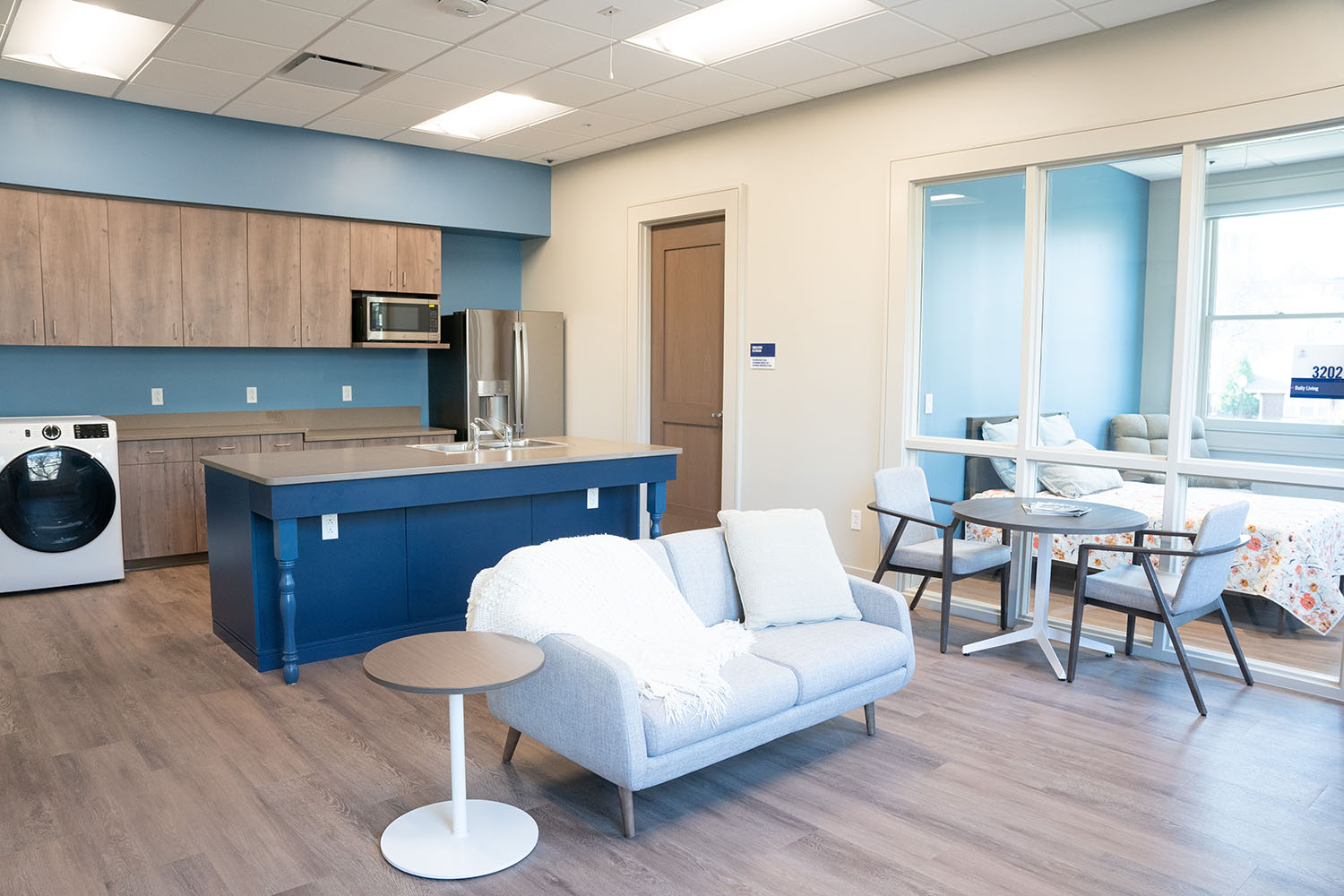
Inpatient Pharmacy Simulation Space
Our inpatient pharmacy simulation space is meticulously designed to replicate the workflow and environment of a hospital pharmacy, focusing on interprofessional collaboration and safe medication administration.
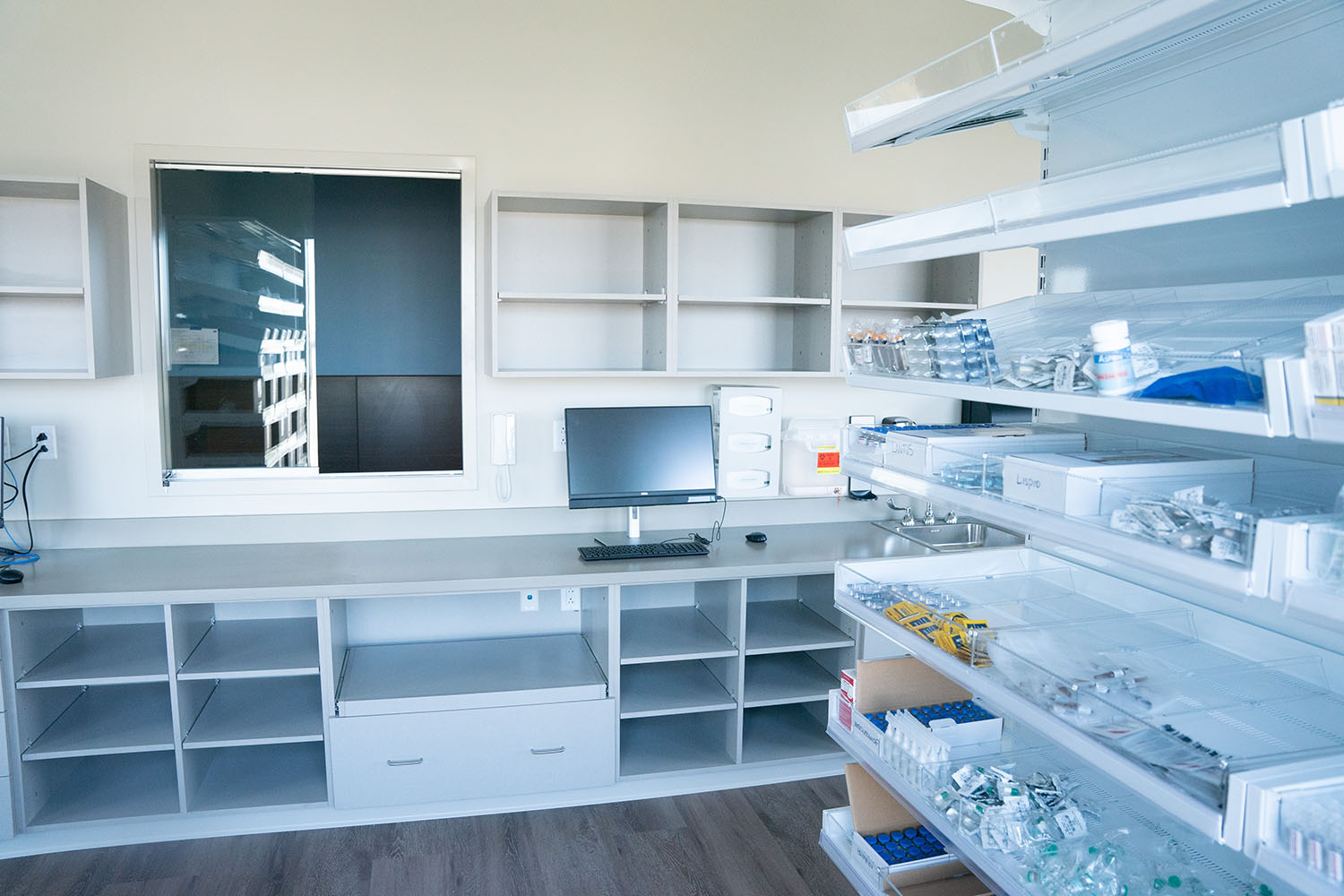
It is equipped with workstations, computers, and communication tools to facilitate seamless collaboration and communication among team members.
Community Pharmacy Simulation Space
Our community pharmacy simulation space is designed to replicate the workflow and environment of a community pharmacy setting, with a focus on patient counseling and medication therapy management (MTM).
This area allows learners to simulate real-world scenarios, such as medication pick-ups, prescription drop-offs, and patient consultations in a controlled environment. Adjacent to the pharmacy counter are two dedicated counseling rooms where learners can conduct private standardized patient consultations. These rooms are equipped with comfortable seating, a table, and educational materials to facilitate confidential discussions about medication therapy, adherence, and health promotion. The pharmacy space also includes a green screen simulated drive-through area where learners can practice providing pharmacy services in this unique scenario.
Debriefing Rooms
Our debriefing rooms are where meaningful reflection, discussion, and learning take place before, during, and after simulation sessions. Designed to facilitate constructive feedback and promote professional growth, our debriefing rooms provide a supportive environment for participants to reflect on their experiences, identify learning points, and enhance their clinical skills. These rooms are equipped with multimedia capabilities, including large display screens or monitors, audiovisual equipment, and video playback systems. This technology allows facilitators to review simulation recordings, display relevant materials or presentations, and facilitate interactive discussions during debriefing sessions. Confidentiality and privacy are paramount in our debriefing rooms; participants can freely express their thoughts, feelings, and experiences without fear of judgment or repercussions. Facilitators ensure that discussions remain confidential, respecting the privacy of all participants involved in the simulation.
Hours of Operation
Saturday – Sunday: Closed
*Hours may differ during school breaks or holidays.
Contact Us
615.460.8805
BUCIESinfo@belmont.edu

